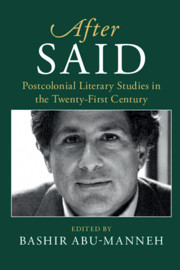Book contents
- After Said
- After Series
- After Said
- Copyright page
- Dedication
- Contents
- Contributors
- Acknowledgments
- Chapter 1 Said’s Political Humanism
- Chapter 2 Said: Birth of the Critic
- Chapter 3 The Dual Legacy of Orientalism
- Chapter 4 Culture and Imperialism
- Chapter 5 Exile as a Political Aesthetic
- Chapter 6 Said and the “Worlding” of Nineteenth-Century Fiction
- Chapter 7 Said and Political Theory
- Chapter 8 Said, Postcolonial Studies, and World Literature
- Chapter 9 Postcolonial and Transnational Modernism
- Chapter 10 Political Predicaments of Exile
- Chapter 11 Orientalism Today
- Chapter 12 Political Economy and the Iraq War
- Further Reading
- Index
Chapter 1 - Said’s Political Humanism
An Introduction
Published online by Cambridge University Press: 21 December 2018
- After Said
- After Series
- After Said
- Copyright page
- Dedication
- Contents
- Contributors
- Acknowledgments
- Chapter 1 Said’s Political Humanism
- Chapter 2 Said: Birth of the Critic
- Chapter 3 The Dual Legacy of Orientalism
- Chapter 4 Culture and Imperialism
- Chapter 5 Exile as a Political Aesthetic
- Chapter 6 Said and the “Worlding” of Nineteenth-Century Fiction
- Chapter 7 Said and Political Theory
- Chapter 8 Said, Postcolonial Studies, and World Literature
- Chapter 9 Postcolonial and Transnational Modernism
- Chapter 10 Political Predicaments of Exile
- Chapter 11 Orientalism Today
- Chapter 12 Political Economy and the Iraq War
- Further Reading
- Index
Summary
- Type
- Chapter
- Information
- After SaidPostcolonial Literary Studies in the Twenty-First Century, pp. 1 - 19Publisher: Cambridge University PressPrint publication year: 2018
- 1
- Cited by

